7 Top DevOps Consulting Companies to Hire in 2025
Discover the top 7 DevOps consulting companies for 2025. This technical guide compares platforms for Kubernetes, CI/CD, and cloud automation.
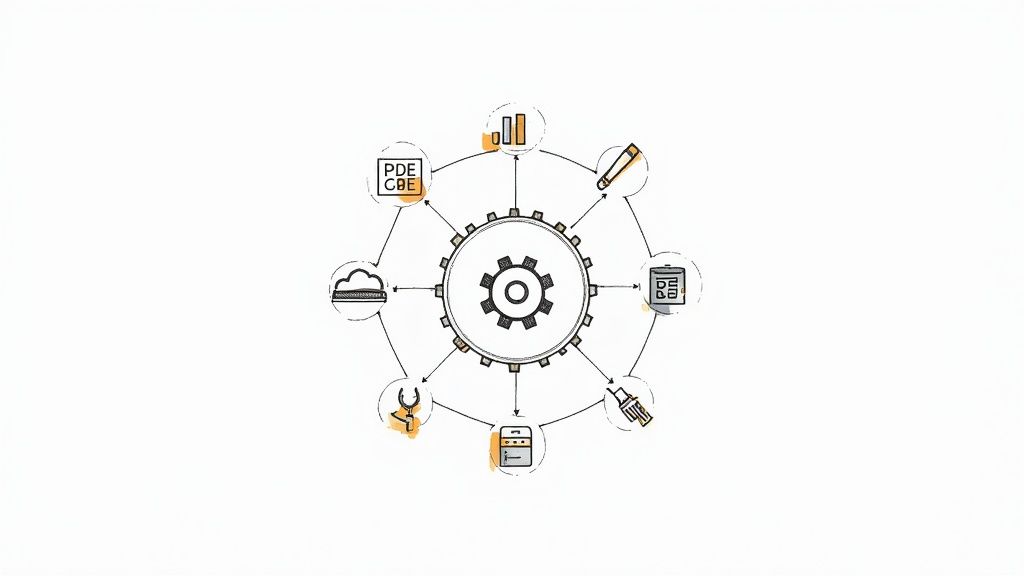
The DevOps landscape is complex, requiring a blend of strategic oversight and deep technical expertise. Selecting the right partner from a sea of DevOps consulting companies can be the difference between a stalled project and a high-velocity software delivery pipeline. This guide moves beyond surface-level comparisons to provide a technical, actionable framework for evaluation. We will dissect the core offerings, engagement models, and unique value propositions of the top platforms and marketplaces. Our focus is on empowering you to make an informed decision based on your specific technology stack, maturity level, and strategic goals.
This roundup is designed for technical leaders, including CTOs, IT managers, and platform engineers, who need to find a partner capable of delivering tangible results. We dive into the specifics of what each company or platform offers, from Kubernetes cluster management and infrastructure-as-code (IaC) implementation with Terraform to CI/CD pipeline optimization using tools like Jenkins, GitLab CI, or GitHub Actions. Before engaging a DevOps partner, it's crucial to understand how to choose a cloud provider that best fits your business needs and long-term strategy, as this choice fundamentally influences your DevOps tooling and architecture.
You will find a detailed, comparative overview of each option, complete with screenshots and direct links to help you navigate their services. We will explore platforms that offer access to pre-vetted senior engineers, marketplaces for official cloud partner services, and specialized consulting firms. This article equips you with the necessary information to choose a partner that not only understands your technical requirements but can also accelerate your software delivery, improve system reliability, and scale your operations effectively.
1. OpsMoon
OpsMoon stands out as a premier platform for businesses aiming to engage elite, remote DevOps talent. Rather than operating like a traditional agency, it functions as a specialized connector, bridging the gap between complex infrastructure challenges and the world's top-tier engineers. The platform's core strength lies in its rigorous vetting process and intelligent matching technology, ensuring clients are paired with experts perfectly suited to their technical stack and project goals.
The engagement process begins with a complimentary, in-depth work planning session. This initial consultation is a critical differentiator, moving beyond a simple sales call to a strategic workshop where OpsMoon architects perform a technical discovery. They assess your existing DevOps maturity, clarify objectives, and collaboratively develop a technical roadmap, often producing an initial architectural diagram or a prioritized backlog of infrastructure tasks. This strategic foundation ensures every project kicks off with clear alignment and a precise plan of action.
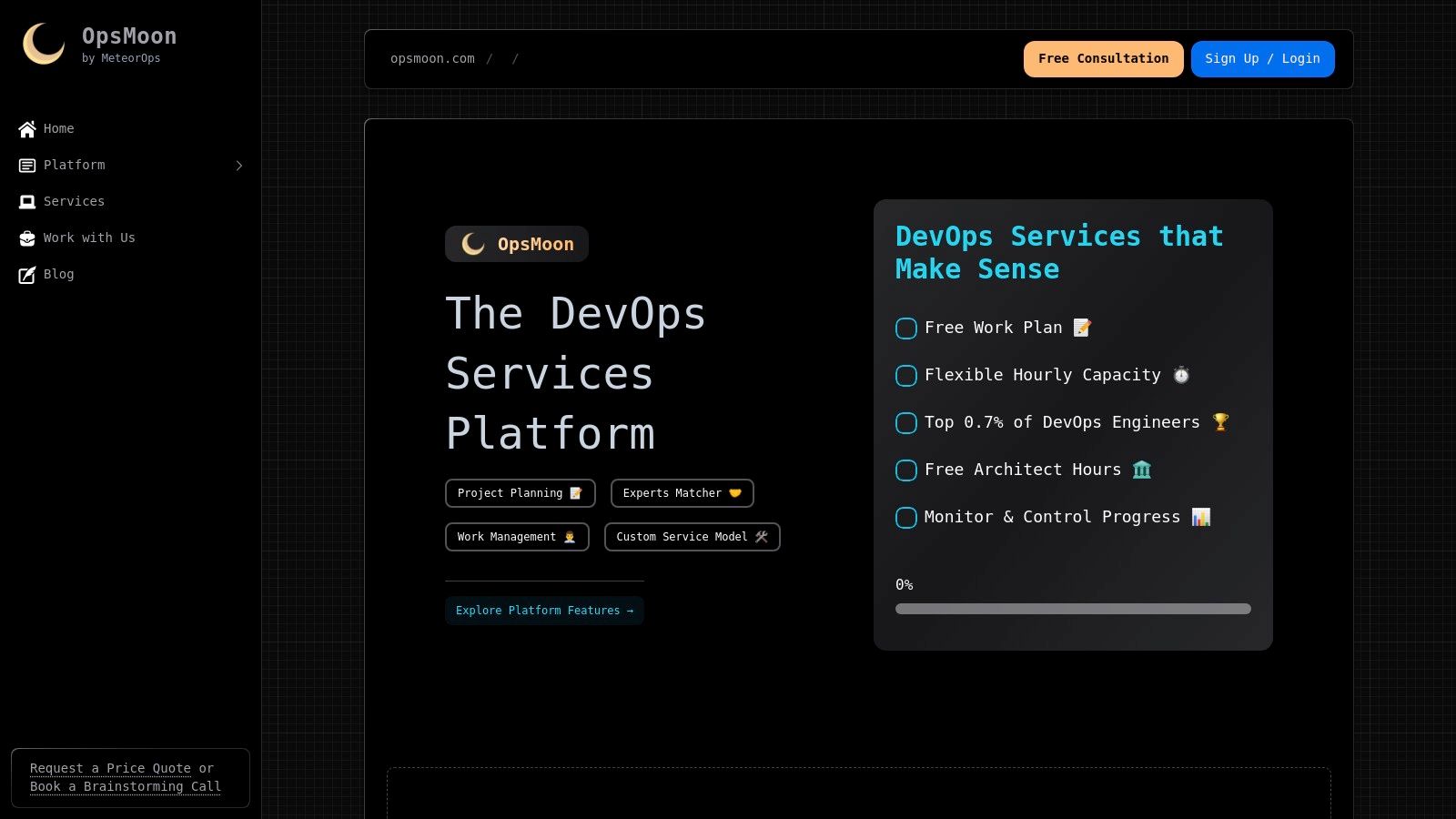
Core Strengths and Technical Capabilities
OpsMoon’s primary value proposition is its exclusive access to the top 0.7% of global DevOps engineers, curated through its proprietary Experts Matcher technology. This system goes beyond keyword matching, analyzing deep technical expertise, project history, and problem-solving approaches to find the ideal fit. This precision makes OpsMoon an exceptional choice for companies needing highly specialized skills.
The platform's service delivery is designed for technical leaders who demand both flexibility and transparency.
- Versatile Engagement Models: OpsMoon adapts to diverse organizational needs, offering everything from high-level advisory and architectural design to full-scale, end-to-end project execution. For teams needing a temporary skill boost, the hourly capacity extension model provides a seamless way to integrate a senior engineer into an existing sprint to tackle a specific epic or technical debt.
- Deep Technical Expertise: The talent pool possesses verifiable, hands-on experience across a modern, cloud-native stack. Key areas include advanced Kubernetes orchestration (including service mesh implementation with Istio or Linkerd), building scalable and repeatable infrastructure with Terraform (using modules and remote state management), optimizing CI/CD pipelines (e.g., Jenkins, GitLab CI, CircleCI), and implementing comprehensive observability stacks using tools like Prometheus, Grafana, and the ELK Stack.
- Transparent Project Execution: Clients benefit from real-time progress monitoring through shared project boards (e.g., Jira, Trello) and inclusive free architect hours. This structure ensures that projects stay on track and that strategic guidance is always available without hidden costs, fostering a collaborative and trust-based partnership.
Why It Stands Out in the DevOps Consulting Landscape
What sets OpsMoon apart from other devops consulting companies is its unique blend of elite talent, strategic planning, and operational transparency. The platform effectively de-risks the process of hiring external DevOps expertise. The free work planning session provides immediate value and demonstrates capability before any financial commitment is made.
Furthermore, its remote-first model offers a significant cost and talent-pool advantage over firms restricted to local markets. By removing geographical barriers, OpsMoon provides access to a global elite of engineers who are often inaccessible through traditional hiring channels. This makes it an ideal partner for startups, SaaS companies, and enterprises looking to build world-class infrastructure without the overhead of an on-premise team.
Actionable Insight: To maximize your engagement with OpsMoon, prepare for the initial work planning session by documenting your current CI/CD pipeline (including tool versions and key plugins), listing your primary infrastructure pain points (e.g., "slow Terraform applies," "flaky integration tests"), and defining 3-4 key performance indicators (KPIs) you want to improve, such as deployment frequency or mean time to recovery (MTTR).
Pros and Cons
| Pros | Cons |
|---|---|
| Access to the top 0.7% of global DevOps engineers via the proprietary Experts Matcher system. | Pricing details are not publicly listed and require a direct consultation to obtain a custom quote. |
| A complimentary, strategic work planning session develops a tailored roadmap before project kickoff. | The remote-first model may not be a fit for organizations that require on-premise or co-located teams. |
| Flexible engagement models (advisory, project-based, hourly) fit various business needs. | |
| Inclusive free architect hours and real-time progress monitoring provide exceptional transparency and value. | |
| Expertise across a wide range of modern technologies like Kubernetes, Terraform, CI/CD, and observability tools. |
For organizations ready to accelerate their software delivery lifecycle with proven, world-class talent, OpsMoon offers a powerful and efficient solution. To explore their specific service offerings in more detail, you can find more information about OpsMoon's DevOps consulting services.
Website: https://opsmoon.com
2. AWS Marketplace – Consulting and Professional Services for DevOps
For organizations deeply integrated with the Amazon Web Services ecosystem, the AWS Marketplace offers a direct and efficient procurement channel for specialized DevOps consulting. It acts as a curated catalog where businesses can find, purchase, and deploy services from a wide range of AWS Partner Network (APN) members. This approach streamlines the often-complex vendor onboarding process, making it an excellent starting point for companies seeking to enhance their cloud-native operations with expert guidance.
The key differentiator for AWS Marketplace is its seamless integration into existing AWS accounts. This allows for consolidated billing, where consulting fees appear alongside your regular cloud service charges, simplifying financial management and bypassing lengthy procurement cycles. This platform is particularly valuable for enterprises that have standardized on AWS and need to find pre-vetted DevOps consulting companies that are guaranteed to have deep expertise in AWS-specific services.
Core Offerings and Technical Specializations
AWS Marketplace lists a broad spectrum of professional services, directly addressing technical DevOps challenges. These are not just generic advisory services; they are often packaged as specific, outcome-driven engagements.
- Infrastructure as Code (IaC) Implementation: Find partners specializing in AWS CloudFormation (including CDK) or Terraform to automate your infrastructure provisioning, ensuring consistent and repeatable environment creation.
- Container Orchestration: Access experts for setting up and managing Amazon Elastic Kubernetes Service (EKS) or Amazon Elastic Container Service (ECS), including cluster design, security hardening with IAM Roles for Service Accounts (IRSA), and CI/CD integration.
- CI/CD Pipeline Automation: Procure services to build robust delivery pipelines using tools like AWS CodePipeline, AWS CodeBuild, and Jenkins on EC2, integrating automated testing and security scanning with tools like SonarQube or Trivy.
- DevSecOps Integration: Engage consultants to embed security into your pipeline using tools like AWS Security Hub, Amazon Inspector, and third-party solutions available through the Marketplace.
How to Use AWS Marketplace Effectively
Navigating the marketplace requires a strategic approach to find the right partner. The user interface allows for granular filtering by use case, partner tier (e.g., Advanced, Premier), and specific AWS competencies.
To maximize its value, start by clearly defining your project scope. Instead of searching for "DevOps help," use specific technical search queries like "EKS migration assessment," "CloudFormation template refactoring," or "Implement AWS Control Tower." This will yield more relevant and actionable service listings. Many listings are for fixed-scope assessments or workshops, which serve as an excellent, low-risk entry point to evaluate a partner's capabilities before committing to a larger project. Furthermore, don't hesitate to use the "Request a Private Offer" feature to negotiate custom terms and pricing directly with a vendor for more complex, long-term engagements.
Website: https://aws.amazon.com/marketplace
3. Microsoft Azure Marketplace – Consulting Services (DevOps)
For businesses committed to the Microsoft ecosystem, the Azure Marketplace serves as a centralized hub for discovering and engaging with vetted DevOps consulting services. It functions as a specialized catalog where organizations can find Microsoft Partners offering packaged solutions designed to accelerate their Azure adoption and operational maturity. This platform is ideal for companies looking to leverage expert guidance on Azure-native tools and hybrid cloud strategies, simplifying the vendor discovery and engagement process.
The primary advantage of the Azure Marketplace is its direct alignment with Microsoft's technology stack and partner network. This ensures that the listed consulting companies possess certified expertise in Azure services. Unlike a general search, the marketplace presents structured offerings, often with predefined scopes and durations, allowing teams to procure specific, outcome-focused engagements such as a two-week pipeline assessment or a four-week Kubernetes implementation.
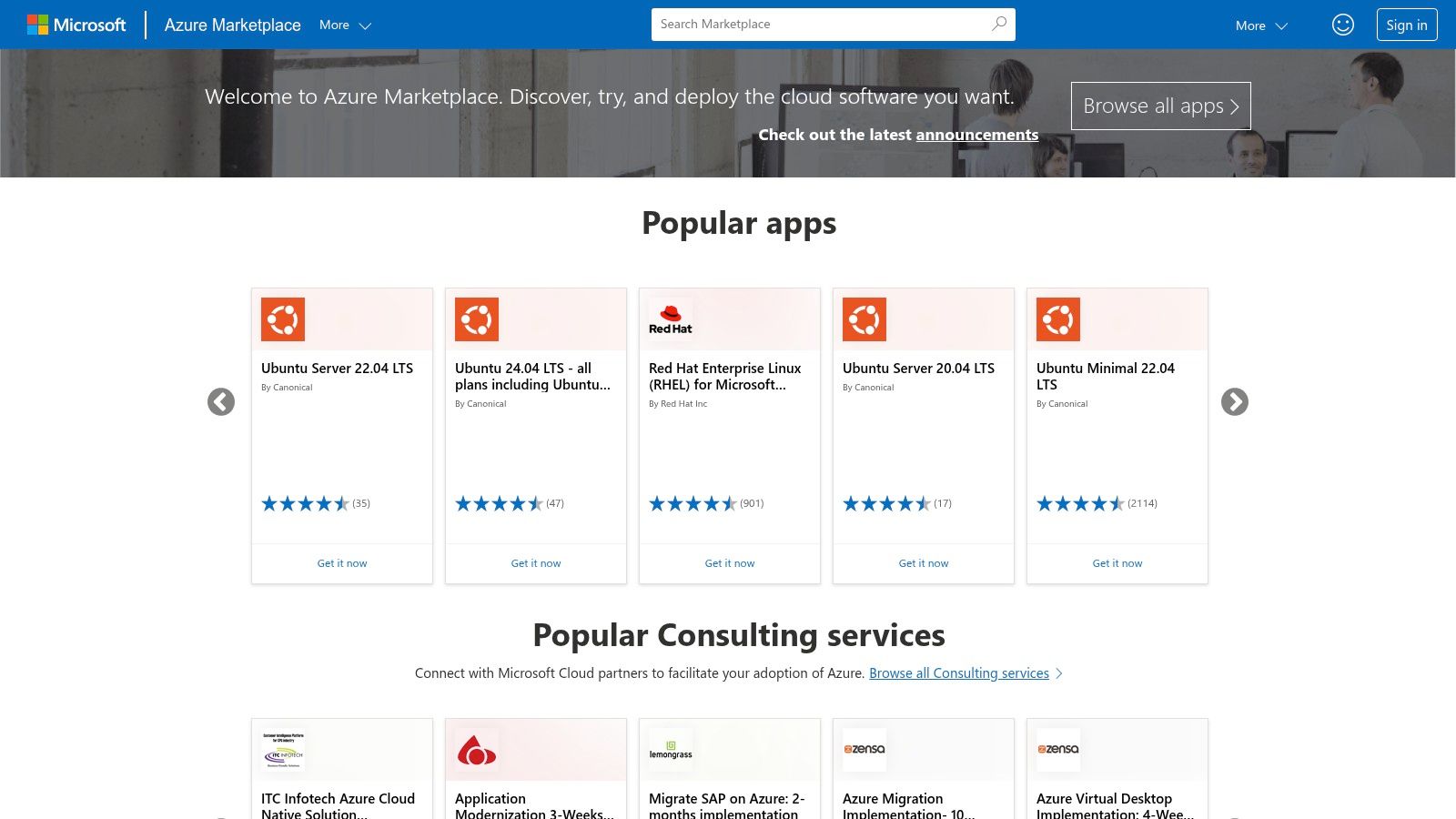
Core Offerings and Technical Specializations
Azure Marketplace consulting services are tailored to solve specific technical challenges within the Microsoft cloud. These are typically hands-on engagements rather than high-level advisory services, focusing on implementation and knowledge transfer.
- CI/CD Pipeline Implementation: Find partners to architect and build robust CI/CD workflows using Azure Pipelines (with YAML pipelines), integrating with GitHub Actions, and automating deployments to various Azure services like App Service or Azure Functions.
- Kubernetes Enablement: Access specialists for deploying, securing, and managing Azure Kubernetes Service (AKS) clusters. This includes GitOps implementation with tools like Flux or Argo CD and integrating AKS with Azure Monitor and Azure Policy.
- Infrastructure as Code (IaC) Adoption: Procure services for creating and managing cloud infrastructure using Azure Bicep or Terraform. Engagements often focus on modularizing code, establishing best practices, and automating environment provisioning with deployment slots for zero-downtime releases.
- DevSecOps Workshops: Engage experts for hands-on workshops to integrate security tooling into your Azure DevOps lifecycle, using services like Microsoft Defender for Cloud and third-party scanning tools like Snyk or Checkmarx. To learn more about how these services can be tailored, you can explore specialized Azure consulting offerings.
How to Use Azure Marketplace Effectively
To get the most out of the Azure Marketplace, a focused search strategy is crucial. The platform allows you to filter by service type (e.g., Assessment, Workshop, Implementation), duration, and partner credentials.
Instead of a generic search for "DevOps," use precise technical terms like "AKS security assessment" or "Bicep module development." Many listings are for fixed-scope, fixed-price assessments or proof-of-concept projects. These are excellent low-risk options to evaluate a partner's technical depth and working style before committing to a larger initiative. While many offerings require a quote, using the "Contact Me" button initiates a direct line to the partner, where you can clarify the scope and receive a detailed proposal tailored to your specific environment and goals.
Website: https://azuremarketplace.microsoft.com
4. Google Cloud Partner Advantage – Find a Partner (DevOps Specialization)
For organizations building on Google Cloud Platform (GCP), the Google Cloud Partner Advantage program is the authoritative directory for finding vetted and specialized DevOps consulting companies. It functions as a high-trust referral network rather than a direct marketplace, connecting businesses with partners that have demonstrated deep technical expertise and proven customer success specifically within the GCP ecosystem. This platform is indispensable for teams looking to leverage Google's powerful suite of DevOps tools, from Google Kubernetes Engine (GKE) to Cloud Build.
The key value of the Partner Advantage directory is the assurance that comes with Google's official validation. Partners must earn Specializations, like the "DevOps" one, by meeting rigorous requirements, including certified technical staff (e.g., Professional Cloud DevOps Engineer) and documented, successful client projects. This pre-vetting process significantly de-risks the partner selection process. Unlike a transactional marketplace, the engagement model is direct; you use the directory to identify and contact potential partners, then negotiate contracts and pricing offline.
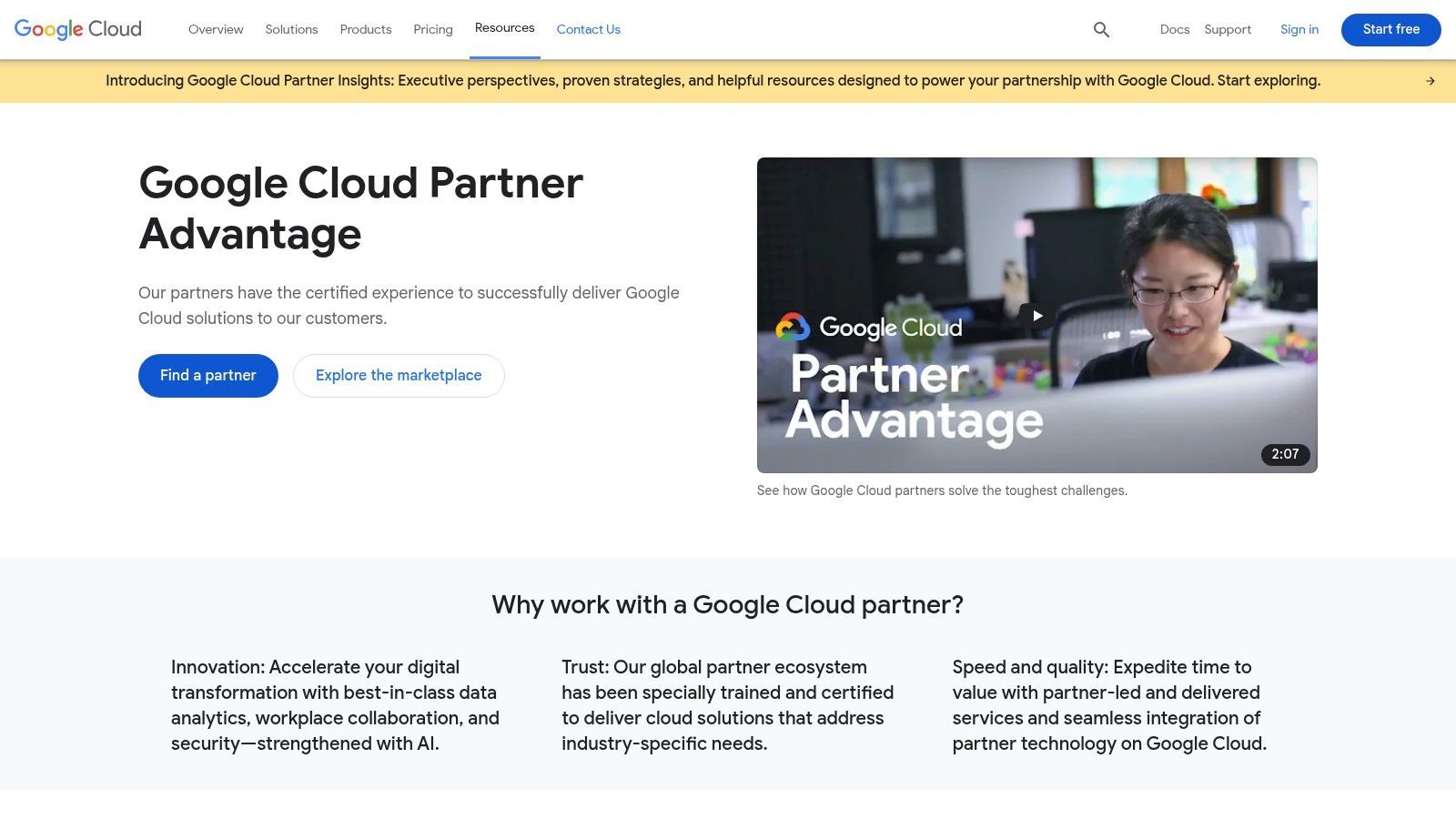
Core Offerings and Technical Specializations
Partners with the DevOps Specialization offer services centered on Google Cloud's opinionated and powerful toolchain, with a strong emphasis on Site Reliability Engineering (SRE) principles. Engagements are typically customized to the client's specific needs.
- Site Reliability Engineering (SRE) Implementation: Engage experts to implement Google's SRE model, focusing on establishing Service Level Objectives (SLOs), error budgets, and building observability with Google Cloud's operations suite (formerly Stackdriver).
- CI/CD on Google Cloud: Find consultants to design and build automated delivery pipelines using Cloud Build, Artifact Registry, and Cloud Deploy, integrating seamlessly with source control like GitHub or Cloud Source Repositories.
- Kubernetes and GKE Excellence: Access top-tier expertise for designing, migrating to, and managing Google Kubernetes Engine (GKE) clusters, including Anthos for multi-cloud and hybrid environments, and implementing security best practices with Binary Authorization.
- Infrastructure as Code (IaC) Automation: Procure services for managing GCP resources programmatically using Terraform (with Google Cloud's provider) or Cloud Deployment Manager, ensuring infrastructure is version-controlled and auditable.
How to Use Google Cloud Partner Advantage Effectively
To get the most out of the directory, use its filtering capabilities to your advantage. Start by selecting the "DevOps" Specialization to narrow down the list to only the most relevant providers. You can further refine your search by geography, industry, and partner tier (Partner or Premier). Premier partners represent the highest level of commitment and expertise within the Google Cloud ecosystem.
When you identify a potential partner, review their profile carefully. Look for specific case studies and customer testimonials that align with your technical challenges or industry. Since the platform is a lead-generation tool, your next step is to initiate contact directly through the provided links. Be prepared with a clear problem statement or project scope, such as "We need to migrate our Jenkins pipelines to a serverless Cloud Build implementation" or "We require an SRE assessment to define SLOs for our GKE-based application." This focused approach will lead to more productive initial conversations and help you quickly evaluate if a partner is the right technical and cultural fit for your team.
Website: https://cloud.google.com/partners
5. Upwork – Hire DevOps Consultants/Freelancers
For organizations needing targeted expertise without the long-term commitment of hiring a full-scale agency, Upwork provides a direct channel to a global talent pool of freelance DevOps engineers and small consultancies. This platform is exceptionally well-suited for businesses looking to supplement their existing teams, tackle specific technical debt, or execute well-defined projects with a clear scope and budget. It democratizes access to highly specialized skills, making it an excellent resource for startups and SMEs.
Upwork's key differentiator is its model of direct engagement and transactional flexibility. You can hire an expert for a few hours to troubleshoot a specific CI/CD pipeline issue, or you can commission a fixed-price project to build out a complete Infrastructure as Code (IaC) setup from scratch. The platform’s built-in escrow system, time-tracking tools, and reputation management provide a layer of security and transparency that de-risks the process of engaging with individual contractors, making it a powerful tool for agile resource allocation.
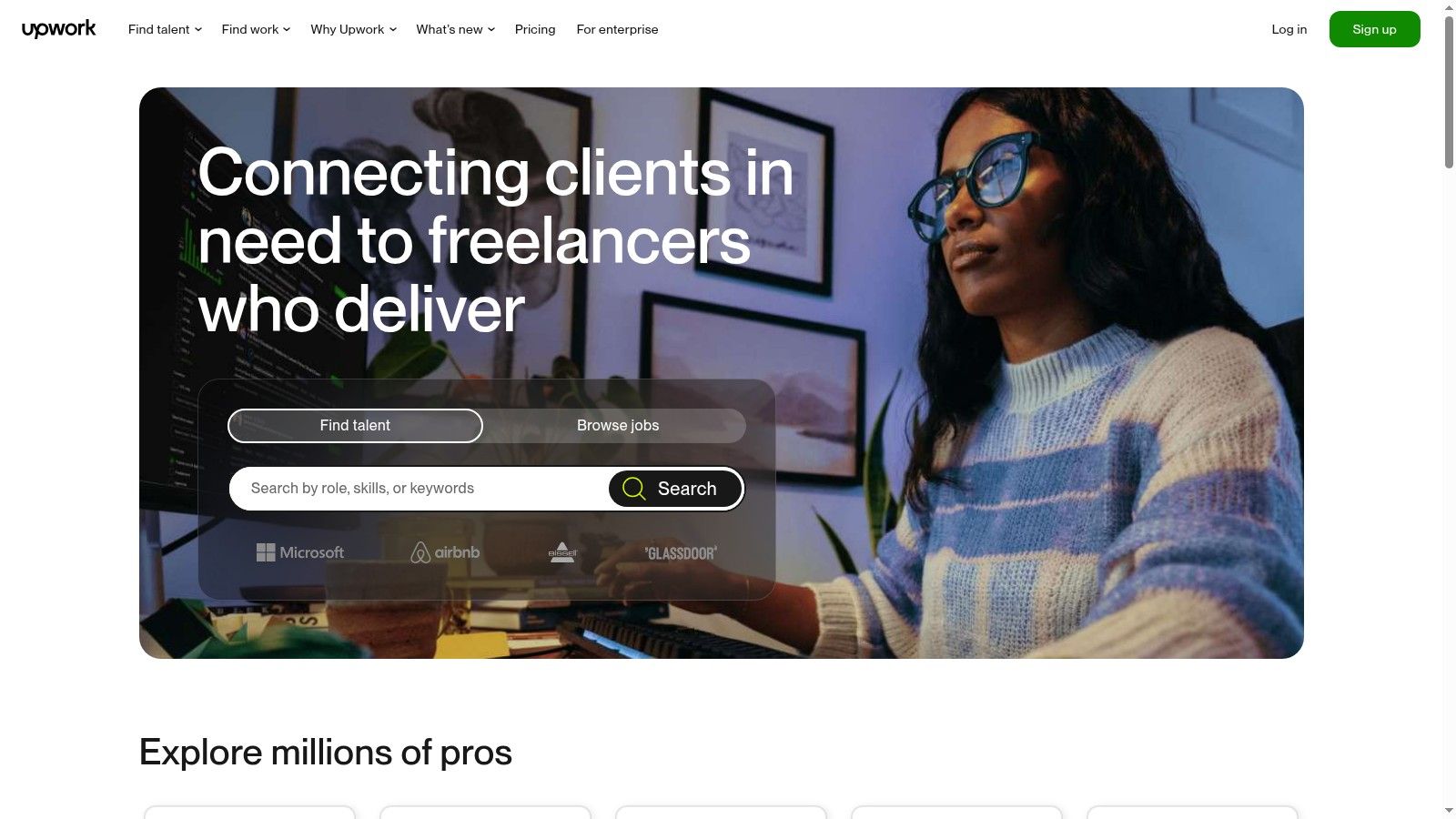
Core Offerings and Technical Specializations
Upwork's strength lies in the breadth of specific, task-oriented skills available on demand. The platform’s "Project Catalog" often features pre-packaged services with clear deliverables and pricing tiers, simplifying procurement for common DevOps needs.
- Cloud-Specific Automation: Find freelancers with deep, certified expertise in AWS CloudFormation, Azure Bicep, or Google Cloud Deployment Manager for targeted IaC tasks.
- CI/CD Pipeline Triage and Optimization: Hire specialists to diagnose and fix bottlenecks in existing Jenkins, GitLab CI, or GitHub Actions pipelines, or to implement specific integrations like SonarQube for static analysis.
- Containerization and Kubernetes Support: Engage experts for specific tasks like creating production-ready Dockerfiles, setting up a Helm chart for a complex application, or configuring monitoring and logging for a Kubernetes cluster using Prometheus and Grafana.
- Scripting and Automation: Access a deep pool of talent for custom automation scripts using Python, Bash, or Go to solve unique operational challenges.
How to Use Upwork Effectively
Successfully finding top-tier DevOps consulting companies or freelancers on Upwork requires a methodical and diligent approach. The platform’s quality is variable, so effective vetting is critical.
Start with a highly specific job post or project brief. Instead of "Need DevOps Engineer," define the task as "Configure AWS EKS cluster with Istio service mesh and integrate with existing GitLab CI pipeline." Use the platform's filters to narrow down candidates by specific skills (Terraform, Ansible, Prometheus), certifications (e.g., CKA, AWS DevOps Professional), and job success scores. For high-stakes projects, conduct a paid, small-scale trial task—such as writing a Terraform module or a small CI pipeline—to evaluate a freelancer’s technical proficiency, communication skills, and reliability before committing to a larger engagement. This approach mitigates risk and ensures you find a partner who can deliver tangible results.
Website: https://www.upwork.com
6. Toptal – Vetted Senior DevOps Engineers and Consulting
For businesses that need to augment their teams with elite, pre-vetted senior DevOps talent rather than engaging a traditional consulting firm, Toptal offers a powerful alternative. Toptal operates as an exclusive network of top-tier freelance engineers, developers, and consultants, connecting companies directly with individuals who have passed a rigorous, multi-stage screening process. This model is ideal for organizations seeking to rapidly onboard a highly skilled DevOps specialist for a specific, technically demanding project without the overhead of a full-service agency.
The platform's primary value proposition is its stringent vetting process, which it claims accepts only the top 3% of applicants. This curation significantly reduces the time and risk associated with hiring, ensuring that any matched consultant possesses deep, proven expertise. Unlike open marketplaces, Toptal provides a managed service, matching clients with suitable candidates in as little as 48 hours, making it one of the fastest ways to secure senior-level DevOps consulting expertise.
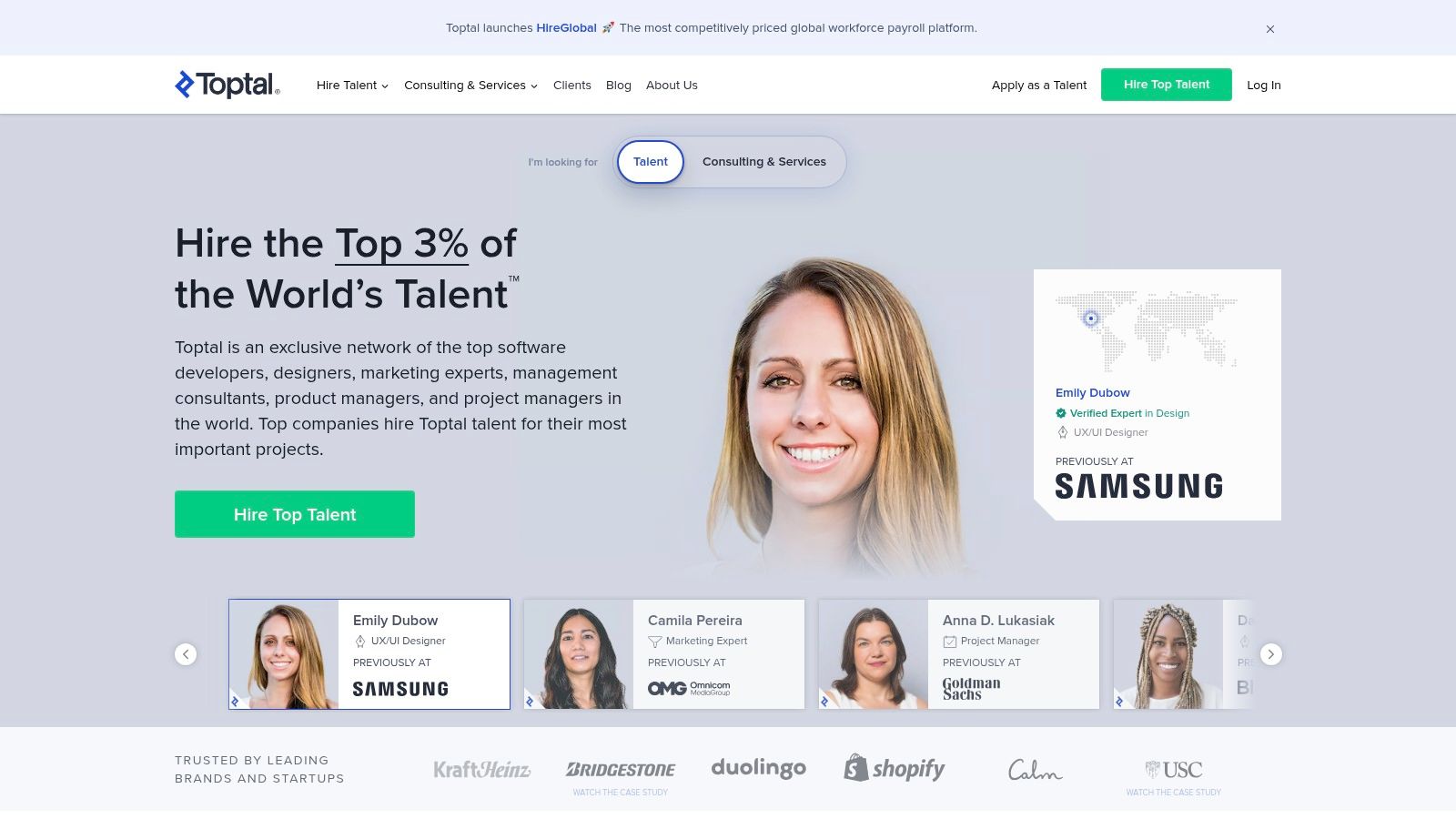
Core Offerings and Technical Specializations
Toptal connects clients with individual consultants who specialize in outcome-driven DevOps engagements. The platform's talent pool covers a wide range of modern cloud-native technologies and practices.
- Cloud Automation and Platform Engineering: Engage experts with deep experience in AWS, GCP, or Azure. Specialists are available for tasks like designing secure landing zones, automating multi-account governance, and building internal developer platforms (IDPs).
- CI/CD Pipeline Optimization: Hire consultants to architect, build, or refactor complex CI/CD pipelines using tools like GitLab CI, GitHub Actions, CircleCI, or Jenkins, focusing on speed, security, and developer experience.
- Kubernetes and Containerization: Access senior engineers for designing and managing production-grade Kubernetes clusters (EKS, GKE, AKS), implementing GitOps with Argo CD or Flux, and optimizing container security.
- Observability and SRE: Onboard Site Reliability Engineers (SREs) to implement comprehensive observability stacks using Prometheus, Grafana, OpenTelemetry, and Datadog, defining SLOs/SLIs and establishing incident response protocols.
How to Use Toptal Effectively
To get the most out of Toptal, you must provide a detailed and precise project brief. Clearly articulate the technical challenges, required skills (e.g., "Terraform expert with GKE experience"), and desired outcomes. This allows Toptal’s matching team to find the perfect candidate quickly.
Leverage the platform's no-risk trial period. Toptal allows you to work with a matched consultant for up to two weeks; if you're not completely satisfied, you won't be charged. This is an invaluable feature for validating technical skills and cultural fit before committing long-term. For organizations looking to fill skill gaps, it's also worth noting that many resources are available that explain the nuances of finding the right talent. For a deeper look, learn more about how to hire a remote DevOps engineer and the key qualifications to look for.
Website: https://www.toptal.com
7. Clutch – Directory of DevOps Consulting and Managed Services Firms
For businesses seeking deep, qualitative insights before engaging a partner, Clutch serves as a comprehensive B2B directory of DevOps consulting companies. It moves beyond simple listings by providing verified client reviews, detailed service breakdowns, and project portfolio examples. This platform is particularly effective for organizations that prioritize third-party validation and want to understand a potential partner’s client management style and project outcomes before making contact.
Clutch's primary value lies in its rich, review-driven data, which helps de-risk the vendor selection process. Unlike transactional marketplaces, Clutch provides a platform for former clients to leave in-depth, verified feedback, often including project scope, budget details, and direct quotes about their experience. This allows decision-makers, such as CTOs and IT managers, to gauge a firm’s technical proficiency, communication skills, and ability to deliver on promises, offering a layer of transparency not found on a company’s own marketing site.
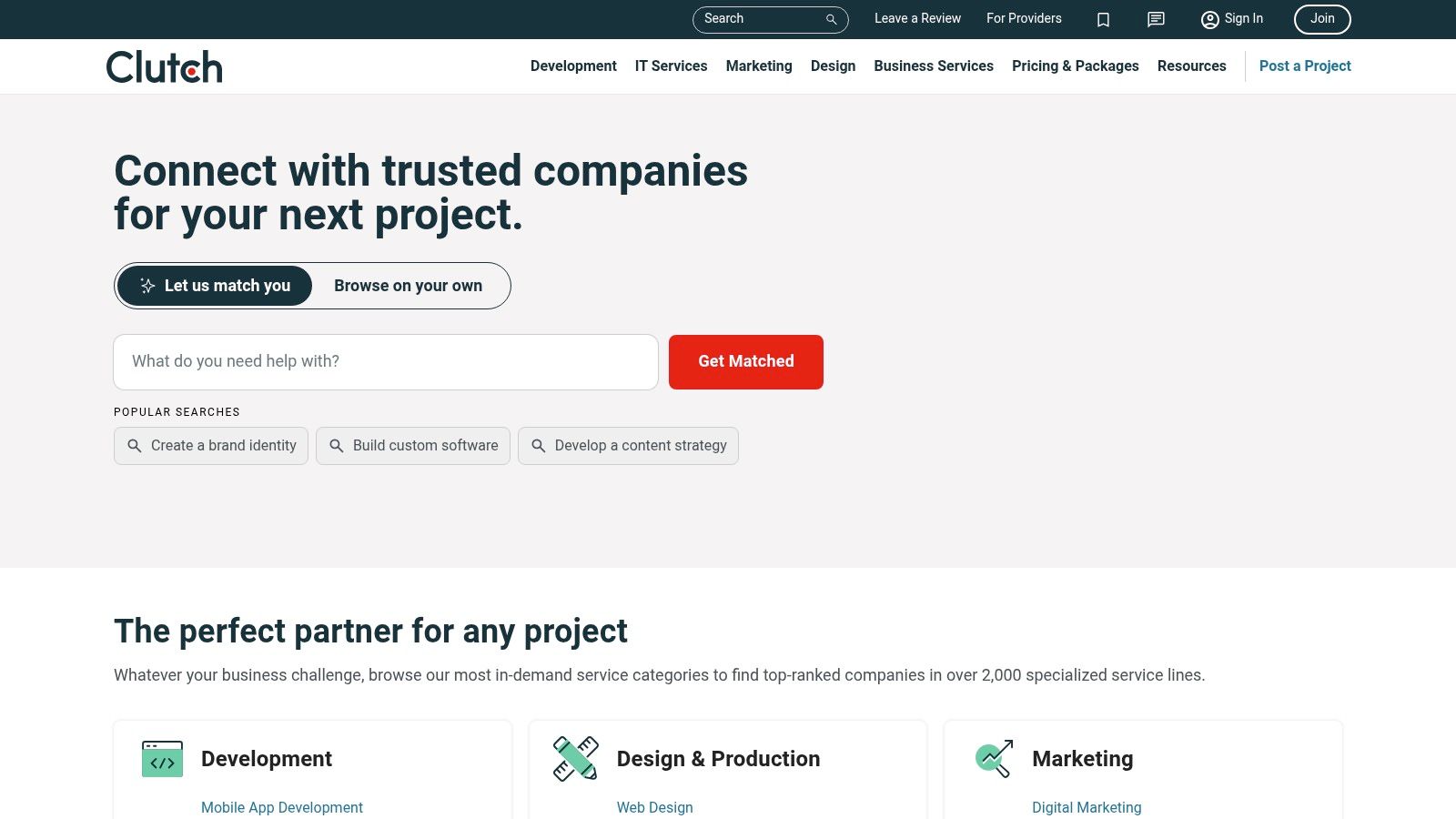
Core Offerings and Technical Specializations
Clutch categorizes firms by their service focus, allowing users to find partners with specific technical expertise. The profiles often detail the percentage of the business dedicated to a particular service, helping you identify true specialists.
- Cloud Platform Expertise: Filter for consultants with verified experience in AWS, Azure, or Google Cloud, often with client reviews detailing specific projects like multi-cloud deployments or cloud-native refactoring.
- CI/CD Implementation Specialists: Identify firms focused on building and optimizing pipelines using tools like Jenkins, GitLab CI, CircleCI, or Azure DevOps. Reviews often mention the specific tools and methodologies used.
- Containerization & Orchestration: Locate partners with a proven track record in Docker and Kubernetes. Look for case studies on their profiles detailing microservices architecture migrations or Kubernetes cluster management.
- Managed DevOps Services: The platform has dedicated categories for finding firms that offer ongoing management, monitoring, and optimization of DevOps infrastructure, ideal for businesses without a large internal team.
How to Use Clutch Effectively
To get the most out of Clutch, you must leverage its advanced filtering and review analysis capabilities. Start by using the location filter to find onshore or nearshore talent, then narrow the results by budget, industry focus, and team size.
Instead of just looking at the overall rating, dive into the individual reviews. Read the full-length interviews to understand the context of the project, the technical challenges involved, and the client's direct feedback on project management and outcomes. Pay close attention to reviews from companies of a similar size and industry to your own. While Clutch is a lead-generation platform requiring direct outreach for proposals, you can use the detailed information on profiles, like hourly rates and minimum project sizes, to create a highly qualified shortlist before you even make first contact. Be mindful of sponsored listings ("Top Placements") and ensure you evaluate them with the same rigor as organic results.
Website: https://clutch.co
Top 7 DevOps Consulting Providers Comparison
| Service/Platform | Implementation Complexity | Resource Requirements | Expected Outcomes | Ideal Use Cases | Key Advantages |
|---|---|---|---|---|---|
| OpsMoon | Moderate to High | Access to elite remote DevOps experts | Accelerated software delivery, improved reliability | Startups to large enterprises needing tailored DevOps solutions | Top 0.7% talent, flexible models, real-time monitoring |
| AWS Marketplace – Consulting and Professional Services | Moderate | Partner services procured via AWS billing | AWS-focused DevOps expertise and implementations | AWS-centric organizations needing vetted vendors | Streamlined vendor onboarding, consolidated billing |
| Microsoft Azure Marketplace – Consulting Services (DevOps) | Moderate | Azure-focused consultancies | Azure-native DevOps enablement and workshops | Companies invested in Azure ecosystems | Microsoft partner credentials, clear scope & timelines |
| Google Cloud Partner Advantage – Find a Partner (DevOps Specialization) | Moderate | Google-validated specialized partners | GCP-aligned CI/CD, SRE, and platform engineering | Teams standardizing on GCP and Kubernetes | Validated expertise, strong GCP/Kubernetes focus |
| Upwork – Hire DevOps Consultants/Freelancers | Low to Moderate | Freelancers of varied experience | Quick start for targeted tasks or pilot projects | Small budgets, short-term or task-specific needs | Transparent pricing tiers, fast onboarding |
| Toptal – Vetted Senior DevOps Engineers and Consulting | Moderate to High | Rigorous screening, senior talent | High-quality, senior-level cloud automation | Complex projects needing elite specialists | Pre-vetted senior talent, rapid matching |
| Clutch – Directory of DevOps Consulting and Managed Services Firms | Moderate | Diverse firms, client reviews available | Well-informed vendor selection, verified references | US buyers seeking detailed vendor data | Rich qualitative data, regional filters |
Finalizing Your Choice: The Path to DevOps Excellence
Navigating the landscape of DevOps consulting companies can feel overwhelming, but the right partner can fundamentally reshape your organization's velocity, reliability, and innovation capacity. This guide has dissected seven distinct avenues for sourcing DevOps expertise, from highly curated talent platforms and cloud provider marketplaces to broad freelancer networks and verified directories. The core takeaway is that there is no single "best" option; the optimal choice is deeply intertwined with your specific technical, operational, and business context.
Your decision-making process should be a deliberate, multi-faceted evaluation, not just a line-item comparison of hourly rates. A successful partnership hinges on aligning a consultant's technical acumen with your strategic objectives. An early-stage startup with a nascent cloud infrastructure has vastly different needs than an enterprise managing a complex, multi-cloud environment with stringent compliance requirements.
Synthesizing Your Options: A Practical Framework
To move from analysis to action, consider your primary drivers. Are you seeking a long-term strategic partner to build a DevOps culture from the ground up, or do you need tactical, project-based expertise to unblock a specific CI/CD pipeline issue?
- For Strategic, Roadmap-Driven Engagements: If your goal is a comprehensive DevOps transformation, platforms like OpsMoon excel. Their model, which often includes free initial planning sessions and a focus on pre-vetted, elite talent, is designed to deliver a clear, actionable roadmap before significant investment. This approach de-risks the engagement and ensures the consultant functions as a true strategic partner, not just a temporary contractor.
- For Ecosystem-Integrated Solutions: If your organization is heavily invested in AWS, Azure, or Google Cloud, their respective marketplaces offer a streamlined path. The primary benefit is simplified procurement and billing, with consultants who are certified experts on that specific platform. However, be prepared to conduct your own in-depth vetting, as the level of curation can vary significantly compared to specialized talent platforms.
- For Tactical, On-Demand Expertise: When you need a specific skill for a well-defined, short-term project, freelancer platforms like Upwork and Toptal provide immense value. Toptal's rigorous screening process offers a higher guarantee of quality, making it suitable for critical tasks, while Upwork provides a broader talent pool at various price points, ideal for more budget-conscious or less complex requirements.
- For Comprehensive Due Diligence: Directories like Clutch are indispensable for gathering qualitative data. The detailed, verified client reviews offer candid insights into a firm's communication style, project management capabilities, and ability to deliver on promises. Beyond specialized DevOps directories such as Clutch, other broader software and service marketplaces like Capterra can also be valuable resources for identifying potential partners and cross-referencing reviews.
Final Technical Considerations Before You Commit
Before signing a contract with any of these DevOps consulting companies, ensure you have clarity on several critical technical and operational points:
- Knowledge Transfer Protocol: How will the consultant's expertise be documented and transferred to your internal team? Insist on comprehensive documentation (e.g., in Confluence or Notion), version-controlled IaC with clear READMEs, and paired programming or training sessions to avoid creating a knowledge silo.
- Tooling and Stack Alignment: Does the consultant have hands-on, production-grade experience with your specific technology stack (e.g., Kubernetes, Terraform, Ansible, Jenkins vs. GitLab CI)? A generalist may not be sufficient for a complex, customized environment. Request anonymized examples of previous work or a technical screening call.
- Security Integration (DevSecOps): How will security be embedded into the CI/CD pipeline? Ask potential partners about their experience with Static Application Security Testing (SAST), Dynamic Application Security Testing (DAST), Software Composition Analysis (SCA) tools, container security scanning (e.g., Trivy, Clair), and secrets management best practices (e.g., HashiCorp Vault, AWS Secrets Manager). A modern DevOps engagement must be a DevSecOps engagement.
- Measuring Success: Define clear, quantifiable metrics from the outset. These could include a reduction in Mean Time to Recovery (MTTR), an increase in deployment frequency, a lower change failure rate, or improved system availability (SLOs). A great consultant will help you define these KPIs and build the dashboards to track them.
Ultimately, the journey to DevOps excellence is a strategic investment in your organization's future. The right consulting partner acts as a catalyst, accelerating your adoption of best practices, modern tooling, and a culture of continuous improvement. Choose a partner who invests time in understanding your business goals, challenges your assumptions, and empowers your team to own the transformation long after the engagement ends.
Ready to move from theory to execution? OpsMoon connects you with a curated network of elite, pre-vetted DevOps consultants who specialize in building scalable, secure, and efficient infrastructure. Start your journey with a free, no-obligation planning session to map out your technical roadmap by visiting OpsMoon.
